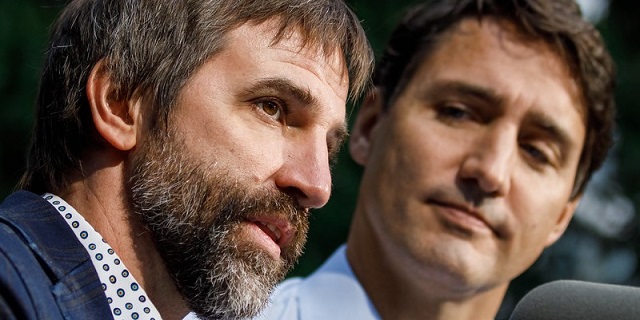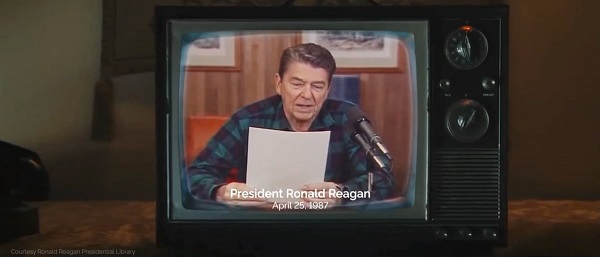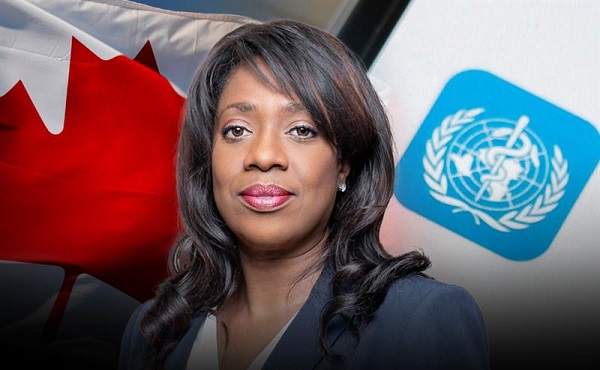Economy
Trudeau Government Capping the Canadian Economy (and Energy Industry) Just to Impress International Agencies

From EnergyNow.ca
By Kasha Piquette
The incoming Trump Presidency has promised to “unleash American energy” with plans to “free up the vast stores of liquid gold on America’s public land for energy development.” This week, the Trudeau government unveiled the draft details of its plans for a cap on greenhouse gas emissions from the Canadian oil and gas sector. These proposed regulations would cap all greenhouse gas emissions equivalent to 35 percent below levels in 2019 with the lofty goal of achieving a 40-45 percent reduction by 2030.
It is a plan that the province of Alberta and others contend would be a cap on production and cause elevated prices for consumer goods across Canada, cost up to 150,000 jobs and reduce national GDP by up to C$1 trillion ($720 billion).
These proposals would make Canada the only oil and natural gas-producing country to attempt an emissions cap on such a scale. The regulations propose to force upstream oil and gas operations to reduce emissions to 35 percent less than they were in 2019 by 2030 to 2032. Notably, while hydrocarbon production increased from 2019 to 2022, Canadian emissions from the sector declined by seven percent.
Perhaps significantly, and much to the apparent annoyance of Alberta’s Premier, the Federal announcement was made slightly ahead of the UN COP29 Climate Summit in Azerbaijan. Per the Paris Agreement, each country submits its climate ambitions to UN as National Determined Contributions (NDCs). However, the federal government has also passed the Net Zero Accountability Act, which, by December 1st, 2024, could require even more aggressive reduction targets for 2035. Does this mean that the federal government may be positioning itself to announce even more ambitious emission targets – all to be announced at that conference?
It is unclear whether, how and in what form, the emissions cap will come into effect. With the next federal election slated for late October 2025 and polls that show the current Liberal-NDP coalition government to be far behind the opposition Conservatives, the federal carbon tax and the proposed emission cap have an uncertain future.
Other business interests have voiced concerns about Canada’s increasingly discordant, incoherent climate policies and regulations, which have caused the Canadian oil and gas sector to be at a competitive disadvantage in the global energy market. Clearly, Alberta considers that the Federal government has, once again, overstepped its constitutional bounds with the proposed emissions cap and, along with its victorious Supreme Court challenge against the Impact Assessment Act, has vowed to launch more court challenges. Alberta and other Provinces have contended that, with regional exemptions, the federal carbon tax is being applied unfairly as a patchwork of standards with Alberta, New Brunswick, Saskatchewan, Ontario and Nova Scotia, and the opposition Conservative party, mounting a growing chorus against the Liberal government’s broader price on carbon. By contrast, the proposed regulations for an emissions cap have been aimed specifically at one industry sector – one that is largely concentrated in western Canada.
Meanwhile, Canadian oil production, aided by the new export capacity of the TransMountain Pipeline completed this year, has grown to a record 5.1 million barrels per day making Canada the prime (60%) source of US crude oil imports in 2023. Meanwhile, the industry has been engaged in considerations for the potential development of carbon capture and storage (CCS) to trap greenhouse gasses underground. However, this untested technology would cost billions, needs to be proven on a larger scale and requires industry cooperation combined with all levels of government support.
The Federal announcement, and the hostile reaction from Alberta and possibly other oil-producing provinces, mean that once again, Canadian investment in the oil and gas sector will be confronted with ever more uncertainty as they encounter time-consuming court challenges. These competing political agendas ensure that major Canadian investment decisions will, once again, be deferred while other international jurisdictions race to develop their hydrocarbon export capabilities, investments that are unencumbered by any emissions caps.
Canadians need to consider carefully how these policies and debates are affecting our energy security and standard of living as Canada. In addition to carbon pricing, Canada has already promulgated regulations for EV mandates in the transportation sector, policies that have required tens of billions in subsidies. It has also introduced the complex clean fuel standard and the proposed national clean electrical standards. These policies are affecting not just Canada’s productivity, GDP and exports. By attacking the Western provinces, Ottawa is unnecessarily creating regional tensions and a less politically stable federation. We need to think about how co-operative federalism can be re-established in ways that account for the basic needs of all Canadians – and not just accommodate arbitrary targets for emissions designed to impress international agencies.
Kasha Piquette is an Alberta-based strategic energy advisor and a former Deputy Minister of Alberta Environment and Protected Areas.
Business
‘TERMINATED’: Trump Ends Trade Talks With Canada Over Premier Ford’s Ronald Reagan Ad Against Tariffs


From the Daily Caller News Foundation
President Donald Trump announced late Thursday that trade negotiations with Canada “ARE HEREBY TERMINATED” after what he called “egregious behavior” tied to an Ontario TV ad that used former President Ronald Reagan’s voice to criticize tariffs.
The ad at the center of the feud was funded by Ontario Premier Doug Ford’s government as part of a multimillion-dollar campaign running on major U.S. networks. The spot features Reagan warning that tariffs may appear patriotic but ultimately “hurt every American worker and consumer.”
Dear Readers:
As a nonprofit, we are dependent on the generosity of our readers.
Please consider making a small donation of any amount here.
Thank you!
“They only did this to interfere with the decision of the U.S. Supreme Court, and other courts. TARIFFS ARE VERY IMPORTANT TO THE NATIONAL SECURITY, AND ECONOMY, OF THE U.S.A,” Trump wrote on his Truth Social platform late Thursday. “Based on their egregious behavior, ALL TRADE NEGOTIATIONS WITH CANADA ARE HEREBY TERMINATED.”
Ford first posted the ad online on Oct. 16, writing in a caption, “Using every tool we have, we’ll never stop making the case against American tariffs on Canada. The way to prosperity is by working together.”
The Ronald Reagan Presidential Foundation and Institute criticized the ad Thursday evening, saying it “misrepresents” Reagan’s 1987 radio address on free and fair trade. The foundation said Ontario did not request permission to use or alter the recording and that it is reviewing its legal options.
The president posted early Friday that Canada “cheated and got caught,” adding that Reagan actually “loved tariffs for our country.”
The ad splices audio from Reagan’s original remarks but includes his authentic statement: “When someone says, ‘let’s impose tariffs on foreign imports’, it looks like they’re doing the patriotic thing by protecting American products and jobs. And sometimes, for a short while it works, but only for a short time.”
Reagan also noted at the end of his remarks that, in “certain select cases,” he had taken steps to stop unfair trade practices against American products and added that the president’s “options” in trade matters should not be restricted, which the ad did not include.
Since returning to the White House, Trump has imposed tariffs on Canadian aluminum, steel, automobiles and lumber, arguing they are vital to protecting U.S. manufacturing and national security.
The Supreme Court is set to hear arguments in November over whether the administration overstepped its authority by invoking the International Emergency Economic Powers Act to impose reciprocal tariffs on dozens of nations, including Canada. Tariffs on commodities such as steel, aluminum and copper were implemented under Section 232 of the Trade Expansion Act and are not currently being challenged, as they align with longstanding precedent established by prior administrations.
Thursday’s move marks the second time this year Trump has canceled trade talks with Ottawa. In June, he briefly halted discussions after Canada imposed a digital services tax on American tech firms, though the Canadian government repealed the measure two days later.
Business
A Middle Finger to Carney’s Elbows Up

Elbows Up Stengthens U.S. Tariff Resolve at Canada’s Expense
The disastrously misguided “Elbows Up” campaign championed by the Carney government rooted in the fantasy that a smug, arrogant Liberal elite wields leverage over the largest economy in human history, has suffered yet another devastating blow. The latest fallout: U.S.-based truck manufacturer Paccar Inc., maker of iconic heavyweights such as Kenworth and Peterbilt, is slashing Canadian production and laying off hundreds of workers in anticipation of a 25-per-cent U.S. import tariff set to take effect next month.
Employees at Paccar’s Sainte-Thérèse, Quebec plant were informed Wednesday that the company will move production of trucks destined for the U.S. market back to its American facilities. According to Daniel Cloutier, Quebec director for Unifor, approximately 300 jobs will be eliminated, leaving roughly 500 workers at the plant.
Honking for Freedom Substack is a reader-supported publication.
To receive new posts and support my work, consider becoming a free or paid subscriber.
“They will continue building trucks for the Canadian market,” Cloutier said, noting that domestic demand represents a much smaller portion of output. At its peak, the plant produced 96 trucks per day; production will now drop to just 18 units daily. That is an 81% drop.
Paccar declined to confirm the restructuring or provide additional details. However, in a financial earnings call a day earlier, CEO Preston Feight described the U.S. tariff policy as advantageous for the company. “I think it helps Paccar significantly,” Feight said. “It gives us a competitive leg up from where we’ve been.”
U.S. Tariffs Driving Industry Shift
U.S. President Donald Trump has confirmed that all medium and heavy-duty trucks imported into the United States will face a 25-per-cent tariff beginning Nov. 1, along with an additional 10-per-cent duty on buses. The tariffs are being imposed under Section 232 of the Trade Expansion Act, which targets imports deemed to pose a national security risk.
These measures follow earlier tariffs that have already struck Canadian steel, aluminum, automobiles, copper, and lumber, forcing companies to shelve investments and reconsider their North American strategies.
Broader Auto Sector Retrenchment
Other automakers are also pulling back production in Canada. General Motors announced Tuesday it is ending production of the Chevrolet BrightDrop electric delivery van in Ingersoll, Ontario, costing over 1,100 workers their jobs. Stellantis recently confirmed plans to shift production of the Jeep Compass from Brampton, Ontario, to Belvidere, Illinois, as part of a strategy to increase U.S. output by 50 per cent by 2029.
Quebec Plant at Risk
The Sainte-Thérèse plant, which manufactures Class 5, 6 and 7 Kenworth and Peterbilt trucks, has already endured two rounds of layoffs over the past year as uncertainty around tariffs weakened demand. At peak production, the facility employed over 1,400 people.
Cloutier said the union is pressing both the Quebec and federal governments to prioritize the purchase of domestically made vehicles to sustain production levels. Without such measures, he warned, the plant could be forced to close due to high fixed costs and insufficient volume. “Let’s not pretend global trade hasn’t changed with this President,” Cloutier said. “We need to stop twiddling our thumbs.”
Bus Manufacturers Also Exposed
Quebec is also home to two major bus manufacturers, Prevost and Nova Bus, both owned by Volvo Group that could face similar challenges due to new tariffs on buses entering the U.S. Executives at both companies say they are still assessing the impact of the policy shift.
What can we learn from all this?
Perhaps our deep reliance on American innovation has consequences we have been unwilling to confront. The warning signs were evident well before Donald Trump’s election. He was explicit that tariffs would be used as a strategic tool to financially incentivize American companies to return to the United States. This was not hidden, it was a core pillar of his economic agenda.
I have said repeatedly on the Marc Patrone Show on Sauga 960 that my frustration is not with America’s strategy, but with Canada’s political class. Their smug arrogance lies in the belief that, as great as Canada can be, we could somehow dominate the greatest economy in the history of civilization rather than work with it. The Trump administration never wanted Canada to become the 51st state; they want our valuable resources and are willing to pay fair value for them, and they expect Canada to finally take our internal security threats seriously; something I have personally presented on in the United States. Yet instead of leveraging our strategic position, Canada’s leadership chose performative resistance over pragmatic partnership.
The most telling moment came when President Trump reportedly asked Justin Trudeau what would happen if the United States imposed a 25-per-cent tariff on all Canadian goods. Trudeau’s response, “It would destroy Canada” was an example of catastrophic stupidity. It handed Trump the gun he could use to execute Canada economically and perhaps cost Canada its sovereignty over the long term.
Reminiscent of the scene from The Hunt for Red October, when Captain Tupolev, in an act of smug Laurentian style arrogance, fires a torpedo at Ramius only for it to circle back and destroy his own submarine, a catastrophic miscalculation born of arrogance and a complete misunderstanding of the enemy’s capabilities. A catastrophic miscalculation that mirrors Elbows Up stupidity.
Order Now!
Honking For Freedom – The Trucker Convoy That Gave Us Hope HonkingForFreedom.com
Twitter | Locals | Rumble | Instagram
www.BenjaminjDichter.com
Audio
Freedom Coffee Podcast
Honking for Freedom Substack is a reader-supported publication.
To receive new posts and support my work, consider becoming a free or paid subscriber.
-

 Agriculture1 day ago
Agriculture1 day agoFrom Underdog to Top Broodmare
-

 Carbon Tax2 days ago
Carbon Tax2 days agoBack Door Carbon Tax: Goal Of Climate Lawfare Movement To Drive Up Price Of Energy
-

 City of Red Deer1 day ago
City of Red Deer1 day agoCindy Jefferies is Mayor. Tristin Brisbois, Cassandra Curtis, Jaelene Tweedle, and Adam Goodwin new Councillors – 2025 Red Deer General Election Results
-

 Alberta2 days ago
Alberta2 days agoCalgary’s High Property Taxes Run Counter to the ‘Alberta Advantage’
-

 Bruce Dowbiggin1 day ago
Bruce Dowbiggin1 day agoIs The Latest Tiger Woods’ Injury Also A Death Knell For PGA Champions Golf?
-

 Alberta2 days ago
Alberta2 days agoAlberta’s licence plate vote is down to four
-

 Health1 day ago
Health1 day agoSovereignty at Stake: Why Parliament Must Review Treaties Before They’re Signed
-

 Business1 day ago
Business1 day ago$15B and No Guarantees? Stellantis Deal explained by former Conservative Shadow Minister of Innovation, Science and Technology









